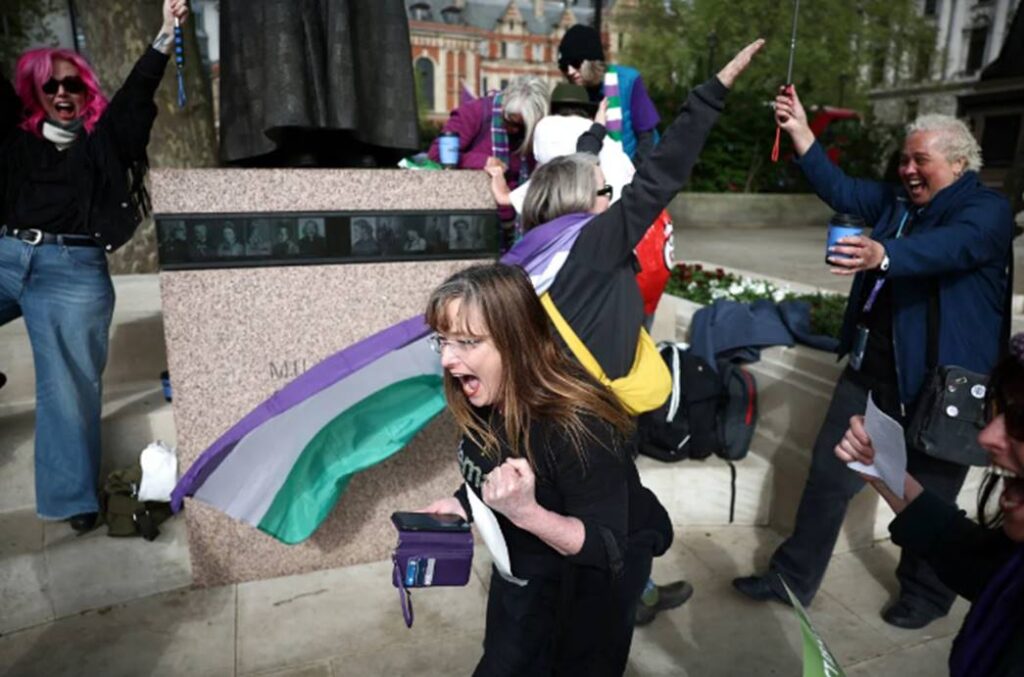GistNexus – April 18, 2025.
In a historic and controversial judgment, the United Kingdom Supreme Court has ruled that the Equality Act 2010 definitions of “woman” and “sex” under law only refer to biological females. This historic verdict will have significant policy implications for UK policies concerning female-only areas and services and will provoke hot reactions from advocacy organizations as well as state agencies.
The ruling follows a long courtroom battle by feminist activists against the Scottish government for attempting to include trans women who possess Gender Recognition Certificates (GRCs) within its meaning of a “woman.” Wednesday’s ruling entails that trans women can now legally be excluded, among other spheres, from female bathrooms, change rooms, domestic violence victim houses, and women’s sports categories.

How the Legal Battle Started and What the Court Decided
The origins of the legal dispute date back to 2018, when the Scottish Parliament passed the Gender Representation on Public Boards (Scotland) Act. The Act aimed to ensure that public boards had at least 50% female non-executive members, and “woman” was defined to include trans people who hold GRCs. For Women Scotland (FWS), a feminist campaigning organization, challenged this definition on the basis that it was incompatible with the Equality Act 2010, which protects single-sex spaces.
Trending News
After years of legal contention, from appeals to their Scottish courts being refused, the case reached the UK Supreme Court. In a unanimous judgment on Wednesday, five judges ruled that under the Equality Act, “woman” only refers to biological women, regardless of any gender recognition status.
Justice Patrick Hodge, in delivering the ruling of the court, emphasized that construing “sex” to include legally defined gender would yield “heterogeneous groupings” and undermine the consistency of the law. The court stated that while transgender individuals remain protected against discrimination under the Equality Act—more specifically on the grounds of gender reassignment—some protections are held back intentionally for biological women.
The ruling emphasizes that transgender women, even if they possess a GRC, cannot claim the right to access female-only services when exclusion is considered proportionate. This clarification extends not only to Scotland but also to the rest of the UK, transforming how public institutions and private organizations approach gender equality in practice.
Wider Implications: Sport, Shelters, and Public Space
The effect of the decision extends far beyond legal definitions to touch a wide range of industries including sport, medicine, public services, and corporate recruitment practices.
In sports where controversy surrounding fairness and inclusivity has intensified, the ruling can mean stricter controls over trans women’s involvement in women’s competition. British Cycling, for example, already keeps trans women from competing in women’s competitions, whereas others like the English Football Association have eligibility criteria based on testosterone levels.
Public institutions, including shelters and hospitals, will need to rethink their policies. Groups like RISE, a Brighton women’s shelter, have already lost government grants for failing to provide adequate facilities for trans women. After this decision, the same types of institutions could legally have women-only areas based on biological sex, as long as they pass the proportionality test under the Equality Act.
Trending News
The British Transport Police has already acted on the judgment, modifying its disputed custody search policy. Same-sex searches will be by biological sex, not acquired gender, illustrating how rapidly public services are aligning to accommodate the new legal framework.
Meanwhile, in the boardrooms and workplaces, trans women will no longer be counted in female quotas. The ruling undoes previous interpretations that allowed trans women with GRCs to occupy spaces for biological women in public and private boards.
The case also suggests the necessity for explicit policy revisions. Lawyers believe that equality law could be changed to better balance the protections enjoyed by biological women and transgender individuals, lessening the chances of future conflicts.
Reactions: A Divided Nation
The response to the Supreme Court’s ruling has been extremely polarized. Feminist organizations such as For Women Scotland and Sex Matters celebrated the judgment, describing it as a “victory for reality” and a “watershed moment” for women’s rights. Activists protested outside the court, chanting “Women’s rights are human rights” and celebrating what they see as a re-affirmation of biological reality in law.
The ruling has been justified by defenders as returning critical protections for women, above all in such vulnerable circumstances as domestic violence refuges and locker rooms. Ex-S Scottish MP Joanna Cherry hailed the ruling as a victory for gender-critical activists’ long-fought campaign.
In contrast, transgender campaign groups have made serious reservations. Groups such as Scottish Trans and LGBTQ charity Stonewall warned that the ruling would further compound discrimination and marginalization against trans people. According to them, the ruling risks undoing 20 years of legal recognition and equality for trans people under UK law.
British trans advocate Ella Morgan reported feeling increased public hostility and discrimination, stating that she was “scared about walking out of my front door” following the ruling.
Human rights groups abroad, including Amnesty International, insisted on bringing laws up to speed to safeguard the rights of trans communities to privacy, marriage, family life, and healthcare no matter what the court decided.
Politically, the reactions have been varied but resoundingly positive to the court’s decision from the dominant parties. The Labour Party has stated the judgment is one that is bringing “clarity and confidence,” and the Conservative Party described it as a “plain victory for common sense.” Both parties have urged government departments to reform existing guidelines forthwith in accordance with the ruling.
The government of Scotland, despite initial resistance, stated it would comply with the ruling and negotiate with stakeholders on how to take its implications into account. First Minister John Swinney further stated that the rights of everybody, including transgender individuals, would guide how they went forward.
Meanwhile, the UK government reaffirmed its commitment to protecting single-sex spaces on a biological sex basis. The government insisted that women’s dignity and safety in hospitals, refuges, and sports clubs remain paramount.
This landmark ruling by the UK Supreme Court entrenches a biological understanding of woman and sex in law, rewriting rights, obligations, and protections across the United Kingdom. Feminist activists hail it as a triumph for women’s rights, whereas transgender activists ring alarm bells that it is a backward move towards discrimination and exclusion.
With the dust settled, institutions, employers, and communities are then left with the delicate task of initiating these changes while attempting to maintain the dignity and rights of all concerned.
Trending News

Reported by GistNexus Team and Edited by Mr. Chibueze Onwuka


